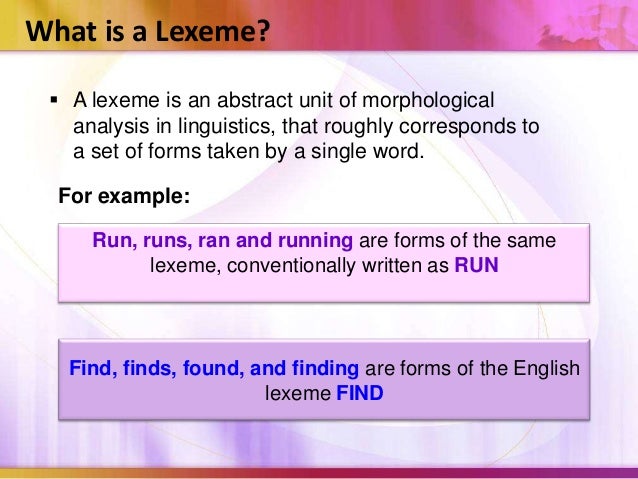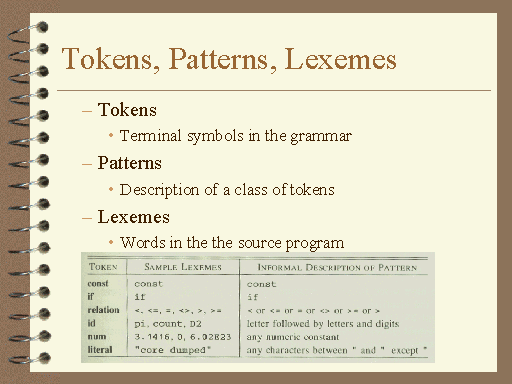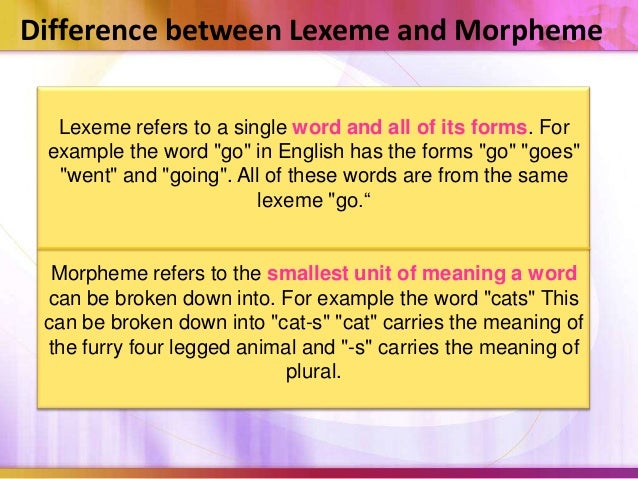Lexeme
Lexeme (derived from Greek lexis 'word' ) is a technical term in linguistics (linguistics), in particular the semantics and lexicology. He refers to a linguistic unit of meaning, of the concrete form (morphology) and the syntactic function abstracted. The term is ambiguous. The exact meaning depends on the underlying theory and the context.
- 3.1 word
- 3.2 word form
- 3.3 morpheme
- 3.4 Monem
- Lemma 3.5
- 3.6 phrase
- 3.7 Sem and sememe
- 4.1 simplex ( base word )
- 4.2 Paralexem
- 4.3 Wortgruppenlexem
- 4.4 archilexeme
- 4.5 Technical lexeme
Term
Lexemes are the building blocks of vocabulary, the lexicon of a language. Lexemes have a semantic meaning. As a " carrier of the conceptual meaning" they are " based on certain objects or phenomena of extra-linguistic reality."
There are several approaches that grasp the concept of the lexeme narrower or wider.
- Syntactic words, the essential features such as basic meaning and part of speech sharing are combined to form a lexeme. The various inflected forms of a verb belong to the same lexeme: So, sing, sing, sing instances of a lexeme; sing, singers are two lexemes. In this sense, the term includes the inflection paradigm of grammatical words.
- This is largely compatible with the mentalistic approach, according to which a lexeme an independent unit of the vocabulary in the mental lexicon is (vocabulary item or lexical unit ).
- In a broader, etymologically oriented understanding is either ( sing among others, the word forms, singer ), only the root word, eg [ singing ], or the entire " Derivationsparadigma " called a lexeme.
Lexemes occur semasiologically each other in mutual relations, cf homonymy, polysemy, multi Semie.
Definitions and procedures
As a lexeme is called an abstract unit of meaning in a language.
In order to identify this unit, you have to first isolate it from other meaningful units - even within individual words. Since most lexemes occur in different words, this lists are usually created in which the lexeme occurs. The similarities between the words of a list format will enable users to derive the single lexeme. So this is the lexeme is an abstract, common basic meaning. Concrete (also: realized, updated) is a lexeme in the word forms.
Lexeme in the narrow sense
In a narrower sense, a lexeme is the meaning of a word unit paradigm.
- ( I ) sing, (you ) sing, ( he ) sings, (we ) sing (her) singing, ( they ) sing: 4 different word forms, syntactic 6 words, 1 lexeme
- Write, wrote, written, etc. have a common lexeme, which is present here in various concretions
Inflection and syntax of word forms do not play a role for the lexeme. The part of speech is in this narrow definition, however, relevant and lexemunterscheidend ( Wortartdependenz ):
- Sing and singers concretize two different lexemes ( SING, SINGER )
A lexeme in this narrow sense is also called semantic word lexical word lexicon word lexical item, lexical element or system word.
Lexeme in the broader sense
Occasionally wortartübergreifende units of meaning are called lexemes. We also speak of a Lexemverband.
- The lexeme ( the Lexemverband ) SING is concretized sing and sing, among other things in the verbs, the nouns in singable singer and song as well as in the adjective
- The lexeme ( the Lexemverband ) FLY will fly among other things, in the words, realized fly or flight
In an even broader understanding of lexemes can also be meaningful parts of words, multi-unit expressions and phrases.
- Parts of words: In the expression impassable come as lexemes into consideration: UN, BE, GEH, BAR
- Put in force; : Multiple- Riger expression Mehrwortlexem half and half; black Friday
- Phrase: someone sitting in the neck
Differentiation from other concepts
Word
As a synonym for word lexeme is often specified and it is, instead of the word speak the semantics of the lexeme. By the term lexeme, the semantics of the emancipated, however vague and semantically considered external word phrase.
The term of the lexeme can both also break through the concept of the word "up" than " down ".
Well longer available from lexicographical reasons this possibility in the foreground, that whole groups of words ( phrases) can form a single lexeme, if " they form an unresolvable semantic unit " (example: bite the dust; occur on the toes someone ( in idiomatic meaning) ).
In addition, parts of words come as lexemes into consideration " when an independent meaning or function in the construction of word forms have " (example: ' un ', ' be ', ' go ', ' bar' in the adjective impassable ).
Word form
The lexeme as abstract semantic unit of a language system must be distinguished from its concrete realizations occurring in speech and writing, which are variable from grammatical or syntactic reasons ( cf. word form, grammatical word, syntactic word).
Morpheme
Denoting the smallest meaningful linguistic unit as a morpheme, a lexeme is a lexical morpheme as opposed to a (only ) grammatical morpheme ( Grammem ). A morpheme can express semantic meaning or grammatical function. A lexeme is just a semantic meaning unit. In classical semantic terminology is a lexeme of at least one lexical morpheme as well as many grammatical Derivationsmorphemen, but abstracts from the possible grammatical Flexionsmorphemen.
Monem
In the special terminology of André Martinet and his students the lexeme is a " lexical (. ) Unit ( ..), which consists of a single Monem " is a lexical Monem in contrast to the morpheme ( then in the narrow sense ) as grammatical Monem.
Lemma
The lemma is the entry or the individual keywords in a dictionary or encyclopedia. It is the lexicographical citation (name ) of a lexeme, which is usually formed according to certain conventions, such as the German noun for the use of the nominative singular.
Phrase
When the term lexeme is used meaning relative, he is not bound to word boundaries. A lexeme in a broader sense can therefore be a word, a word element or phrase.
Whole phrases are used as lexemes especially in consideration, "if they have a idiomatic ( non-transparent ) importance. "
Shem and sememe
Sem is called (sometimes ) in the semantic component analysis, the smallest unit of meaning. A lexeme, according to this terminology from one or more Semen.
The delimitation of the concept sememe depends on what is meant by a sememe. The same applies to the concept of Semantems.
Species
Simplex ( base word )
A simple lexeme is called simplex (also: base word; Einzelwortlexem ). The simplex is neither derived nor assembled and can serve as a starting point for further word formations.
Paralexem
A Paralexem (Greek para, with ' lexis ' word' ), also: Mehrwortlexem, forms the contrast to the simplex. In contrast to the simplex a Paralexem is the result of Zusammenrückung or a composition ( compound ) of several words ( see also: word formation ).
Wortgruppenlexem
The Wortgruppenlexem in turn is a Paralexem, which is also composed of at least two lexical items, but which together form a dictionary entry. ( See also: Phraseologismus ) Wortgruppenlexeme are " semantically indissoluble, lexicalized phrases ".
Archilexeme
Archilexeme called a lexeme, " whose content is identical to that of an entire word field " ( Coseriu ) and is therefore part of the contents of all the semantic field associated lexemes. It is a generic term or hypernym of several lexemes.
A archilexeme is " the lexical realization of a Archisemems ", which can consist of one or more Semen.
" The archilexeme represents in texts often its subordinate lexemes and acts as a rule in the definition and ( lexicographically ) Meaning Explanation as proximum genus ( hypernym ) ". The content of a word element of the field results from archilexeme plus differential importance.
The archilexeme as a generic term of the field members of a lexical field itself and those in hyponymischen ratio, that is, they are hyponyms by him or with other words: " archilexeme lexeme and each other in the ratio of inclusion. "
Not always a archilexeme is realized lexically.
Technical lexeme
In the area of compiler construction are lexemes consequences of lexical atoms. Lexemes are thus syntactic atoms or symbols.








